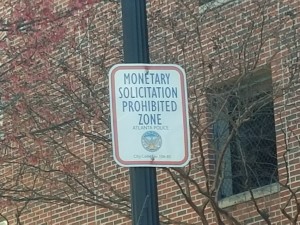U.S. Supreme Court Homeless Ruling Suggests Atlanta Laws Unconstitutional
 (APN) ATLANTA — A recent ruling by the Supreme Court of the U.S. calls into question the constitutionality of several Atlanta laws that criminalize homeless people.
(APN) ATLANTA — A recent ruling by the Supreme Court of the U.S. calls into question the constitutionality of several Atlanta laws that criminalize homeless people.
Atlanta’s laws criminalizing urban camping (106-12), public urination (106-30), and monetary solicitation (106-85) each raise issues under the Eighth Amendment, which is the Federal Constitution’s prohibition on “cruel and unusual punishment.”
Additionally, Atlanta’s curfew law (106-27), as applied to homeless youth, is likely unconstitutional.
On December 16, 2019, the Supreme Court of the U.S. declined to overturn a previous ruling of the Ninth Circuit U.S. Court of Appeals that city laws that criminalize homeless people are a violation of the Federal Constitution.
The case is City of Boise, Idaho v. Robert Martin et al., Supreme Court docket 19-247.
The lower court version of the case is commonly cited as Bell v. Boise.
In Bell v. Boise, the U.S. District Court found that laws that criminalize activities that are intrinsic to survival as a human being, in jurisdictions that fail to provide adequate housing opportunities that meet the needs of the specific jurisdiction, are “status based” laws – and as such, are cruel and unusual punishment.
In this case, such laws target people who are homeless on the basis of the status of their being homeless.
Here’s how this principle applies in general:
When cities have inadequate shelter or affordable housing, criminalizing urban camping amounts, to criminalizing sleep for homeless people.
When cities have inadequate shelter or affordable housing, and inadequate public restrooms, criminalizing public urination amounts to criminalizing urination for homeless people.
When cities have inadequate shelter or affordable housing, criminalizing asking for money in entire geographic areas amounts to criminalizing homeless people from obtaining the money they need to survive or possibly come out of homelessness.
When cities have inadequate shelters for youth, curfew laws criminalize homeless youth for existing at night.
In 2016, the U.S. Department of Justice, under then-director Eric Holder, agreed with the law’s challengers, filing an amicus brief, or friend of the court brief, with the U.S. District Court for the Ninth Circuit, agreeing that Idaho’s law was unconstitutional.
The City of Boise, Idaho, had a law criminalizing sleeping in public, which it had labeled as a type of disorderly conduct.
Boise’s law is similar to Atlanta’s law in that Atlanta bans urban camping, in Code of Ordinances, Part II, Chapter 106, Sec. 106-12 (“Urban Camping”).
Ms. Janet F. Bell, who was homeless, was one of several people who were charged for sleeping in public, and who challenged Boise’s law under the Eighth Amendment.
The U.S. District Court sided with the homeless petitioners and with the U.S. Department of Justice who had filed the amicus brief.
Then, the U.S. Court of Appeals had upheld the decision of the lower court in Bell v. Boise.
The City of Boise had petitioned for the Supreme Court of the U.S. to re-hear the case.
https://www.supremecourt.gov/docket/docketfiles/html/public/19-247.html
After a lengthy consideration of whether to re-hear the case, in which numerous cities, counties, U.S. states, and various organizations filed briefs with the court on both sides, the Supreme Court left the lower court’s ruling intact.
While the Supreme Court’s declining to hear the case is not as meaningful as if the Supreme Court had made the decision affirming the unconstitutionality itself, the ruling is a big deal.
The Ninth Circuit tends to produce opinions that are generally more progressive on social and economic issues, than the Eleventh Circuit which includes Georgia.
There is no Eleventh Circuit decision on point; however, the Supreme Court’s action in declining to re-hear Bell v. Boise suggests that it would have been upheld if the Court had in fact heard the case.
(END / Copyright Atlanta Progressive News / 2019)